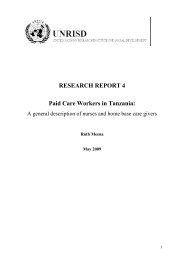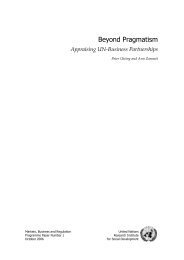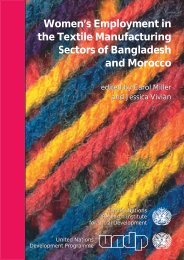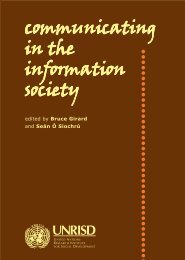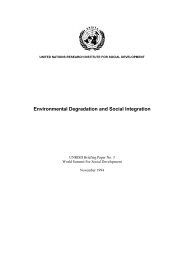The Politics of Gender and Reconstruction in Afghanistan
The Politics of Gender and Reconstruction in Afghanistan
The Politics of Gender and Reconstruction in Afghanistan
You also want an ePaper? Increase the reach of your titles
YUMPU automatically turns print PDFs into web optimized ePapers that Google loves.
EVOLVING INSTITUTIONAL FRAMEWORKS AND WOMEN’S RIGHTS: POTENTIALS AND LIMITATIONS<br />
law <strong>and</strong> <strong>in</strong>formal dispute resolution mechanisms may threaten the very legitimacy <strong>of</strong> the legal reform process<br />
<strong>in</strong> the rural h<strong>in</strong>terl<strong>and</strong>, <strong>and</strong> may appear top-down <strong>and</strong> undemocratic at a critical political juncture. On the other<br />
h<strong>and</strong>, some <strong>of</strong> the most discrim<strong>in</strong>atory practices aga<strong>in</strong>st women, such as the custom <strong>of</strong> bad—<strong>of</strong>fer<strong>in</strong>g women as<br />
brides <strong>in</strong> reparation to an aggrieved party <strong>in</strong> cases <strong>of</strong> crim<strong>in</strong>al <strong>of</strong>fences—would be given an <strong>in</strong>def<strong>in</strong>ite lease <strong>of</strong> life<br />
without reforms at the national level (Azarbaijani-Moghaddam 2003).<br />
One strategy adopted by women activists is to separate tribal customs from Islamic laws, argu<strong>in</strong>g that most<br />
discrim<strong>in</strong>atory practices orig<strong>in</strong>ate from customary laws giv<strong>in</strong>g themselves a (false) veneer <strong>of</strong> Islam. A conference<br />
organized by women, the Islamic Awareness Programme, <strong>in</strong>vited male religious scholars to consider reth<strong>in</strong>k<strong>in</strong>g<br />
the issue <strong>of</strong> women’s rights with<strong>in</strong> an Islamic framework. This divided the scholars, with some support<strong>in</strong>g the<br />
spirit <strong>of</strong> the women’s dem<strong>and</strong>s while others argued that women were not qualified to pass judgement on such<br />
issues. 45 Women legal experts will, no doubt, cont<strong>in</strong>ue to endeavour to forge alliances with more progressive<br />
sections <strong>of</strong> the clergy.<br />
Alongside the complications occasioned by these compet<strong>in</strong>g sources <strong>of</strong> legislation, the corpus <strong>of</strong> statutory laws<br />
presents itself <strong>in</strong> layers, each correspond<strong>in</strong>g to particular periods <strong>of</strong> governance. Statutory laws were enacted<br />
under the Constitutions or Interim Constitutions <strong>of</strong> <strong>Afghanistan</strong> <strong>of</strong> 1964, 1977, 1980, 1987, 1990 <strong>and</strong> 1992. Lau<br />
(2001–2002) po<strong>in</strong>ts out that decid<strong>in</strong>g which particular laws will be applied or reformulated is primarily a political<br />
exercise, a view amply v<strong>in</strong>dicated by the process <strong>of</strong> deliberation <strong>and</strong> compromise apparent <strong>in</strong> the <strong>in</strong>itial draft<strong>in</strong>g<br />
<strong>and</strong> amendments <strong>of</strong> the new Constitution.<br />
After the Bonn Agreement, the Judicial Reform Commission (JRC) was charged with rebuild<strong>in</strong>g the domestic<br />
justice system <strong>in</strong> accordance with Islamic pr<strong>in</strong>ciples, <strong>in</strong>ternational st<strong>and</strong>ards, the rule <strong>of</strong> law <strong>and</strong> Afghan legal<br />
traditions. <strong>The</strong> JRC worked <strong>in</strong> close co-operation with the Constitutional Commission <strong>and</strong> the <strong>Afghanistan</strong><br />
Independent Human Rights Commission (AIHRC). However, issues perta<strong>in</strong><strong>in</strong>g to the respective roles <strong>of</strong><br />
statutory, Islamic <strong>and</strong> customary laws, <strong>and</strong> the place <strong>of</strong> <strong>in</strong>formal law <strong>and</strong> dispute resolution mechanisms still<br />
rema<strong>in</strong> unresolved. A recent report on <strong>Afghanistan</strong>’s Millennium Development Goals acknowledged that<br />
address<strong>in</strong>g the social role <strong>of</strong> women will require “sensitive issues <strong>of</strong> prioritization <strong>and</strong> strategy” (UNDP 2004:26).<br />
Aga<strong>in</strong>st this background, the legal rights <strong>of</strong> women cont<strong>in</strong>ue to represent an area <strong>of</strong> great uncerta<strong>in</strong>ty <strong>in</strong><br />
<strong>Afghanistan</strong>. Most women deta<strong>in</strong>ees <strong>in</strong> Kabul prison seem to be there not for crim<strong>in</strong>al acts but for <strong>of</strong>fences<br />
related to family law: refus<strong>in</strong>g to marry husb<strong>and</strong>s chosen by their parents, refus<strong>in</strong>g to live with abusive husb<strong>and</strong>s,<br />
or runn<strong>in</strong>g away from the parental or matrimonial home—<strong>of</strong>fences which have no basis <strong>in</strong> law. Human<br />
rights abuses aga<strong>in</strong>st women cont<strong>in</strong>ue to occur with the “active support or passive complicity <strong>of</strong> state agencies,<br />
armed groups, families <strong>and</strong> communities”(Amnesty International 2003). Decisions taken by <strong>in</strong>formal <strong>in</strong>stitutions<br />
such as the household or the community that might, <strong>in</strong> other contexts, be modified or contested through<br />
recourse to state laws are, more <strong>of</strong>ten than not, underwritten <strong>and</strong> endorsed by formal <strong>in</strong>stitutions such as the<br />
judiciary <strong>in</strong> <strong>Afghanistan</strong>. Amnesty International noted that female victims <strong>and</strong> defendants are be<strong>in</strong>g denied<br />
access to justice <strong>and</strong> discrim<strong>in</strong>ated aga<strong>in</strong>st <strong>in</strong> both the formal <strong>and</strong> <strong>in</strong>formal justice systems. 46<br />
45 UNIFEM 2004. Note that such divisions among the clergy are not uncommon <strong>and</strong> have received a great deal <strong>of</strong> attention <strong>in</strong> the Islamic Republic <strong>of</strong> Iran.<br />
46 Bribes may be paid to keep women <strong>in</strong> prison until they relent <strong>and</strong> fall <strong>in</strong> with their families’ wishes. This results <strong>in</strong> the judiciary be<strong>in</strong>g used to discipl<strong>in</strong>e<br />
women by impos<strong>in</strong>g custodial sentences for crimes that do not exist on the statute books (like runn<strong>in</strong>g away).<br />
PAGE 25




